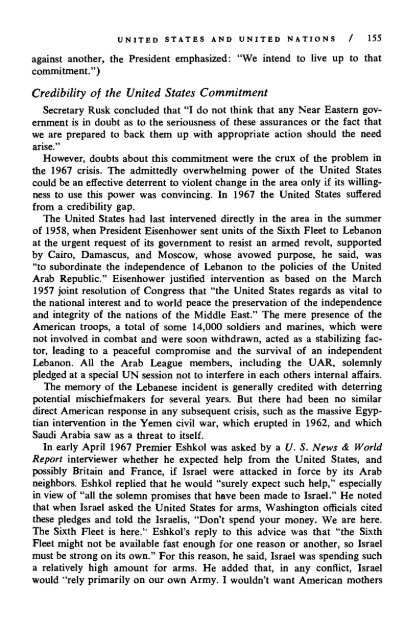1968_4_arabisraelwar
You also want an ePaper? Increase the reach of your titles
YUMPU automatically turns print PDFs into web optimized ePapers that Google loves.
UNITED STATES AND UNITED NATIONS / 155<br />
against another, the President emphasized: "We intend to live up to that<br />
commitment.")<br />
Credibility of the United States Commitment<br />
Secretary Rusk concluded that "I do not think that any Near Eastern government<br />
is in doubt as to the seriousness of these assurances or the fact that<br />
we are prepared to back them up with appropriate action should the need<br />
arise."<br />
However, doubts about this commitment were the crux of the problem in<br />
the 1967 crisis. The admittedly overwhelming power of the United States<br />
could be an effective deterrent to violent change in the area only if its willingness<br />
to use this power was convincing. In 1967 the United States suffered<br />
from a credibility gap.<br />
The United States had last intervened directly in the area in the summer<br />
of 1958, when President Eisenhower sent units of the Sixth Fleet to Lebanon<br />
at the urgent request of its government to resist an armed revolt, supported<br />
by Cairo, Damascus, and Moscow, whose avowed purpose, he said, was<br />
"to subordinate the independence of Lebanon to the policies of the United<br />
Arab Republic." Eisenhower justified intervention as based on the March<br />
1957 joint resolution of Congress that "the United States regards as vital to<br />
the national interest and to world peace the preservation of the independence<br />
and integrity of the nations of the Middle East." The mere presence of the<br />
American troops, a total of some 14,000 soldiers and marines, which were<br />
not involved in combat and were soon withdrawn, acted as a stabilizing factor,<br />
leading to a peaceful compromise and the survival of an independent<br />
Lebanon. All the Arab League members, including the UAR, solemnly<br />
pledged at a special UN session not to interfere in each others internal affairs.<br />
The memory of the Lebanese incident is generally credited with deterring<br />
potential mischiefmakers for several years. But there had been no similar<br />
direct American response in any subsequent crisis, such as the massive Egyptian<br />
intervention in the Yemen civil war, which erupted in 1962, and which<br />
Saudi Arabia saw as a threat to itself.<br />
In early April 1967 Premier Eshkol was asked by a U. S. News & World<br />
Report interviewer whether he expected help from the United States, and<br />
possibly Britain and France, if Israel were attacked in force by its Arab<br />
neighbors. Eshkol replied that he would "surely expect such help," especially<br />
in view of "all the solemn promises that have been made to Israel." He noted<br />
that when Israel asked the United States for arms, Washington officials cited<br />
these pledges and told the Israelis, "Don't spend your money. We are here.<br />
The Sixth Fleet is here." Eshkol's reply to this advice was that "the Sixth<br />
Fleet might not be available fast enough for one reason or another, so Israel<br />
must be strong on its own." For this reason, he said, Israel was spending such<br />
a relatively high amount for arms. He added that, in any conflict, Israel<br />
would "rely primarily on our own Army. I wouldn't want American mothers


